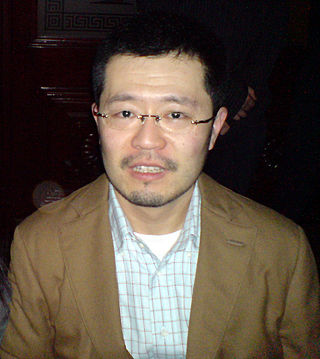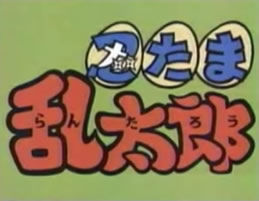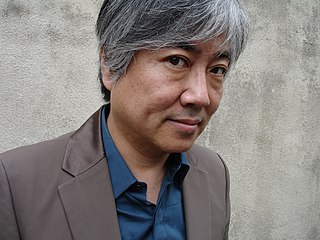Kōji Makaino (馬飼野 康二, Makaino Kōji, born 26 January 1948) is a Japanese pop music composer, arranger, and musician. He is the elder brother of composer Shunichi Makaino.
Kōji Makaino (馬飼野 康二, Makaino Kōji, born 26 January 1948) is a Japanese pop music composer, arranger, and musician. He is the elder brother of composer Shunichi Makaino.
Makaino was born in the city of Toyohashi, in Aichi Prefecture. His father Noboru was a music-lover and amateur composer, and he got Kōji to become familiar with musical instruments. He, his father, and his brother played together as a tango band. After graduating from Aichi Prefectural Commercial High School in Toyohashi, he studied music at the Naomi College of Music before dropping out in 1967 join a group called "Blue Sharm." The group only issued four singles, and broke up in 1970. [1]
Since 1972, when he arranged for Hideki Saijo's album Chance wa Ichido, he has worked in composition and arrangement. He has been active composing Kayōkyoku ; idol songs; enka ; film, TV drama, and anime soundtracks; and commercial songs; among others. Besides his hundreds of compositions, he was in charge of soundtrack for a number of anime series, most notably The Rose of Versailles , and a few live action series and films. He has worked under the pseudonyms Mark Davis, Jimmy Johnson, Michael Korgen, from the fact that since the late 1970s, many foreign artists have been hired on TV CMs, and because he wanted to show he had a foreign style in some ways. [1]
Makaino's compositions are:
Films, anime series, etc. where Makaino has been credited for the soundtrack:
Listed by the year they started airing.
Michiru Yamane is a Japanese video game composer and pianist. Yamane's musical style draws on baroque, classical and rock traditions, with both Johann Sebastian Bach and Yellow Magic Orchestra as prominent influences. She is best known for her two decades of work at the gaming company Konami, with her compositions for the Castlevania series among her most recognized work.

Aichi Prefecture is a prefecture of Japan located in the Chūbu region of Honshū. Aichi Prefecture has a population of 7,552,873 and a geographic area of 5,172.92 square kilometres (1,997.28 sq mi) with a population density of 1,460 inhabitants per square kilometre (3,800/sq mi). Aichi Prefecture borders Mie Prefecture to the west, Gifu Prefecture and Nagano Prefecture to the north, and Shizuoka Prefecture to the east. Nagoya is the capital and largest city of the prefecture.

Mamoru Fujisawa, known professionally as Joe Hisaishi, is a Japanese composer, musical director, conductor and pianist, known for over 100 film scores and solo albums dating back to 1981. Hisaishi's music has been known to explore and incorporate different genres, including minimalist, experimental electronic, Western classical, and Japanese classical. He has also worked as a music engraver and arranger.

Shirō Hamaguchi is a Japanese anime composer, arranger and orchestrator. He is best known for composing music to the anime franchises Girls und Panzer, One Piece, and Oh My Goddess! and arranging/orchestrating music in the Final Fantasy series. He frequently collaborates with fellow composers Kohei Tanaka and Akifumi Tada on anime scores.
Michiru Oshima is a Japanese composer and arranger. She works on music in wide range of areas, such as anime, films, television series, video games and concerts. She has written scores for over 100 movies, over 200 television titles, video games, various types of events, concerts, theaters, among others. Ōshima is one of the most prolific living composers for film, anime and video game. She has released over 300 CDs including film soundtracks and artist CDs. Her works include composition for Godzilla vs. Megaguirus, Godzilla Against Mechagodzilla, and Godzilla: Tokyo S.O.S. movies and scores for numerous anime television series, including Fullmetal Alchemist, Fullmetal Alchemist the Movie: Conqueror of Shamballa, Nabari no Ou, Queen Emeraldas, Xam'd: Lost Memories, Arc the Lad, and Weathering Continent. In addition to the soundtracks on Kaiju films and anime music, she has composed music for several video games such as Genghis Khan II: Clan of the Gray Wolf for Super NES, Ico for PlayStation 2, Legend of Legaia for PlayStation and its PlayStation 2 sequel Legaia 2: Duel Saga, Arc the Lad III, Deemo, Midnight Play by the company Tivola based on the art illustrations of Květa Pacovská, and an orchestral arrangement of a Zelda medley for the Wii and GameCube game The Legend of Zelda: Twilight Princess. She was also the composer for a Japanese stage musical adaptation of the classic Hollywood film Roman Holiday. Her latest work includes the composition of several music tracks for the highly acclaimed Chinese espionage thriller film The Message and a 2017 Chinese mystery thriller film The Devotion of Suspect X (film).

Kitty Films Co., Ltd. was a production company established in 1972 in Japan. They were a pioneer in releasing full anime television series in a single set. The sound recording work by Ken'ichi Benitani on their 1979 film, Almost Transparent Blue, was co-nominated for Outstanding Achievement in Sound Recording at the 3rd Japan Academy Film Prize ceremony in 1980.

Pastel Yumi, the Magic Idol is a magical girl anime series by Studio Pierrot. It was simultaneously released as a manga by Kiyoko Arai. The fourth magical girl series created by Studio Pierrot, Pastel Yumi also appears in a feature-length OVA as well as the Majokko Club Yoningumi A-kūkan kara no Alien X OVA. Anime Sols attempted to crowd-fund the release of the show on North American DVD, but was not successful.
Yuji Nomi is a Japanese composer. His work includes the Studio Ghibli films Whisper of the Heart (1995) and The Cat Returns (2002), as well as the Kyoto Animation television series Nichijou (2011). His mentor was Ryuichi Sakamoto, whom he helped with Royal Space Force: The Wings of Honnêamise and The Last Emperor.

Nintama Rantarō is a Japanese anime series produced by Ajia-do Animation Works and Japanese broadcast on NHK since April 10, 1993. It is an adaptation of the manga series Rakudai Ninja Rantarō, written and illustrated by Sōbe Amako. Nintama Rantarō centers on the title character and his friends as they attend a school for budding ninjas. Like the manga on which it is based, there is a considerable amount of anachronisms for comedic purposes; for example, the titular character Rantarō is bespectacled. The anime also references other Japanese media personalities such as Ken Shimura. The series is currently the longest-running anime on NHK. The official English title is Ninjaboy Rantaro.
Kōji Ueno is a Japanese composer, musician, arranger and keyboardist. He is noted for his unique style of music.

Rakudai Ninja Rantarō is a comedy ninja manga series created by Sōbē Amako in 1986. The anime adaptation, Nintama Rantarō, began broadcasting on NHK in 1993 and a side-story anime film Eiga Nintama Rantarō premiered in 1996. Several Nintama Rantarō video games have also been published since 1995.
Shuhei Naruse is a Japanese musician, composer, and music arranger from Kyoto Prefecture. Naruse attended Ritsumeikan University. His major debut as a musician was in the rock band DEVELOP=FRAME where he played keyboards. He has since worked on the composition and arrangement for various Avex Trax musical artists, including the soundtracks of Kamen Rider Den-O, Kamen Rider Kiva, and Kamen Rider Fourze.
Tomoki Hasegawa III is a Japanese composer and arranger of music from Osaka Prefecture, Japan, best known for his work on anime soundtracks. He has also done sound production work on albums for Mayumi Iizuka.
Events in 2010 in Japanese television.

Yasuaki Shimizu is a Japanese composer, saxophonist and producer. He is known for his interpretations of the music of J.S. Bach, in particular the "Cello Suites 1-6" re-arranged for and performed on tenor saxophone.
Events in 2011 in Japanese television.

Ninja Kids!!! is a 2011 Japanese family-oriented comedy film directed by Takashi Miike. The film is live-action adaptation of the Japanese anime series Nintama Rantarō. The film stars Seishiro Kato as Rantaro who is sent to a ninja training school by his parents. During the summer, they are challenged by a group of rival ninjas which culminates in a race to ring a bell on top of a mountain.

The Rose of Versailles, also known as Lady Oscar and La Rose de Versailles, is a Japanese manga series written and illustrated by Riyoko Ikeda. It was originally serialized in the manga magazine Margaret from 1972 to 1973, while a revival of the series was published in the magazine from 2013 to 2018. The series is a historical drama set in the years preceding and during the French Revolution. Using a combination of historical personages and original characters, The Rose of Versailles focuses primarily on the lives of two women: the Queen of France Marie Antoinette, and Oscar François de Jarjayes, who serves as commander of the Royal Guard.

"Lady Diamond" is a song by Japanese idol group Sexy Zone. It was released on April 11, 2012, as its second single under Pony Canyon. The song was written by Gorō Matsui and Kōji Makaino. All tracks on the single were used as theme songs for various television series.